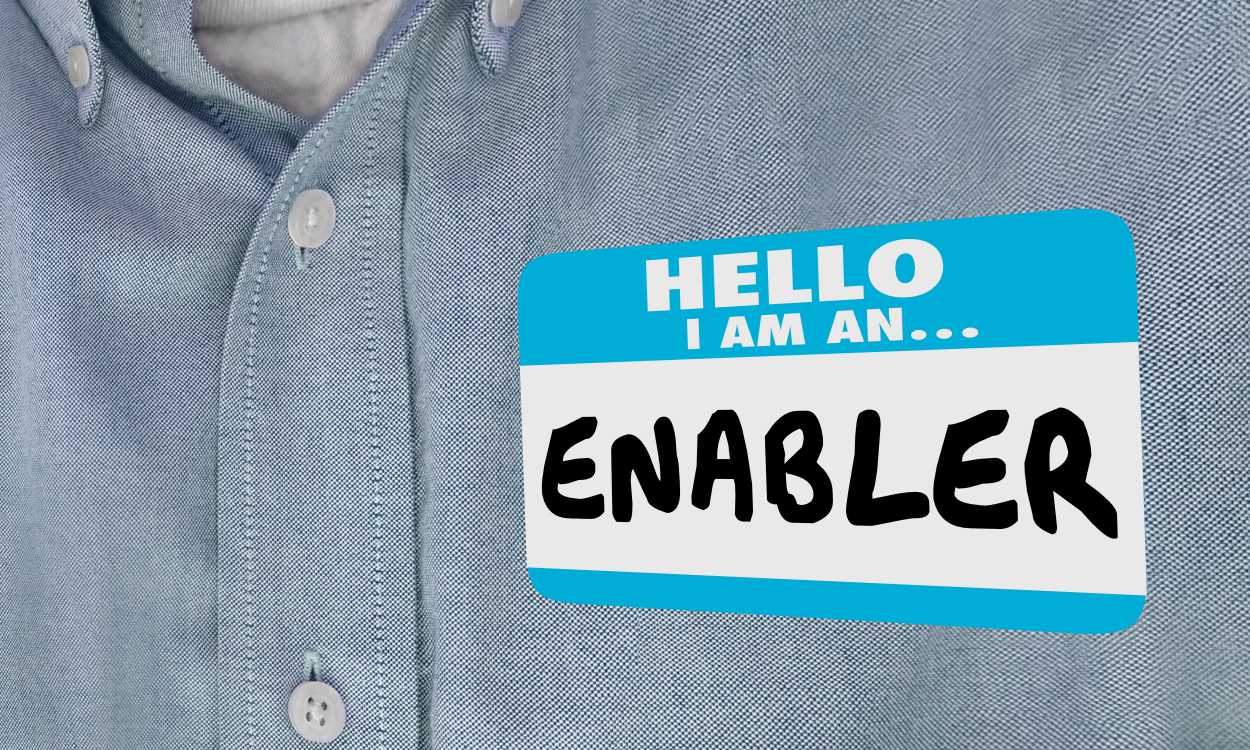Watching a loved one suffer from the disease of addiction can drum up several emotions ranging from deep sadness and fear to resentment and red hot anger. There is no way to walk away from the wreckage of an addiction unscathed, even if you are not the one who is drinking or using drugs. This disease has the potential to permeate every single life it touches, which is why addiction is often referred to as a “family disease”.
If someone in your family is addicted to drugs or alcohol, you play a role in their addiction whether you intend to or not. Countless people approach the addict or alcoholic in their family with the best intentions but still find themselves working hard to keep them from experiencing any repercussions of their disease. This is known as enabling.
What is Enabling Behavior?
Anyone can become an enabler to an addict or an alcoholic. The desire to keep a loved one from failing comes from a place of love and compassion. For example, a person does not want their loved one to lose his job, get in trouble with the law, or grow withdrawn from others because of addiction. A person’s natural response is to protect their loved ones at all costs, so doing anything but seems disingenuous. But addiction is a highly complex disease, so sometimes doing what seems “natural” does not always bring about the desired results. In fact, attempting to protect a loved one while they are actively addicted to drugs or alcohol is unequivocally counterproductive to affecting any positive, lasting change.
It is important to know how to identify enabling behavior so that if you are actively enabling your loved one, you can take action to stop doing so immediately. Enabling someone while they are drinking or using drugs will only give them the resources they need to keep using, which is the exact opposite of what you likely want. So, what exactly are enabling behaviors? Consider the following:
Ignoring the user’s negative behaviors. When you ignore negative behaviors such as getting into trouble with the law, growing violent when under the influence, or neglecting responsibilities due to substance abuse, you are signaling to your loved one that their behaviors are not inappropriate or outrageous enough to bother you. Turning an eye to their behaviors is the equivalent of pouring gasoline on an already lit fire.
Rationalizing the user’s behavior. Addiction is a scary disease. No one ever wants to think that their loved one is an addict or an alcoholic simply out of fear for what that could mean for their future. So when you see your loved one engaging in substance abuse, your reaction might be to immediately minimize their use in your mind and find ways to rationalize it. You rationalize an addiction when you find acceptable reasons for why your loved one is using it. And while that is understandable, it is dangerous because it gives the user the power to keep using.
Covering up for the addict’s behavior. Covering up for your loved one’s behavior while under the influence means that you are always right there to clean up the mess before anyone even gets to see it. When an addict or an alcoholic does not experience repercussions of their use, they convince themselves that they can continue to use without consequence, which is extremely dangerous.
Blaming others for your loved one’s addiction. Whether you do this on your own or alongside your addicted loved one, allowing the actions of an addict or alcoholic to be the fault of anyone else but themselves in enabling behavior. For example, someone’s husband goes out to dinner with his friends and comes home drunk. It is enabling behavior to say that he’s only getting drunk because his friends encourage it.
Walking on eggshells (emotionally). A loved one’s addiction can have everyone feeling like they are walking on eggshells around them, meaning that if they say or do anything that is not in keeping with the opinion of the user, they will upset the user. An example of this would be a mother who withholds her real feelings about her son’s addiction for fear of him no longer speaking to her. Rather than being honest about her concerns, the mother instead continues to go along with her son’s actions even if they are dangerous.
Making threats with no follow-through. For example, saying that you are going to kick your loved one out of the house if they come home high one more time and then not following through with that consequence is enabling behavior. Anytime you tell your addicted loved one that there will be repercussions for their actions but fail to uphold those repercussions, you are enabling their continued use.
How to Stop Enabling Behavior
So, what are you supposed to do when you realize that you are enabling your loved one? You probably feel overwhelmed by the thought of changing so many of your own behaviors, but ending your enabling does not have to be a major overhaul. Some of the things that you can do immediately to stop enabling behavior include the following:
- Encourage recovery — Instead of engaging in enabling behaviors, encourage your loved one to get help. Let them know that you are willing to help them get the process started and that you will support them along the way.
- Set boundaries –Decide for yourself what your personal boundaries are and make a commitment to yourself to not let your loved one cross them. This can be extremely difficult even though it is necessary. For example, you may decide that you do not want your loved one to visit when they are under the influence. So, when your loved one knocks on the door, simply informing them that they are not allowed to visit when high or drunk is all you need to do to uphold your boundaries. Keeping it as clear and simple as possible is key.
- Don’t react with them — Addicts and alcoholics tend to have a lot of chaos surrounding them, as their lives are out of control. If your loved one is high or drunk and starts to pick a fight with you, don’t react. If your loved one is panicking that they do not have any more alcohol in the house, don’t react. When you react alongside an addict or alcoholic, you fan the fire. Maintaining control during times of reactionary behavior is where your power lies.
Learning how to stop enabling a loved one can take hard work and effort. If you are ready to stop enabling someone, reach out for help. Therapists and support groups like Al-Anon and Nar-Anon can show you the way.
Do You Have a Loved One Who Needs Help? Call Us Now.
Your loved one does not need to keep abusing drugs or alcohol. Addiction is a disease that is treatable and can be managed for a lifetime. If your loved one is ready to seek professional help for their substance use disorder, reach out to us right now. We can help.






